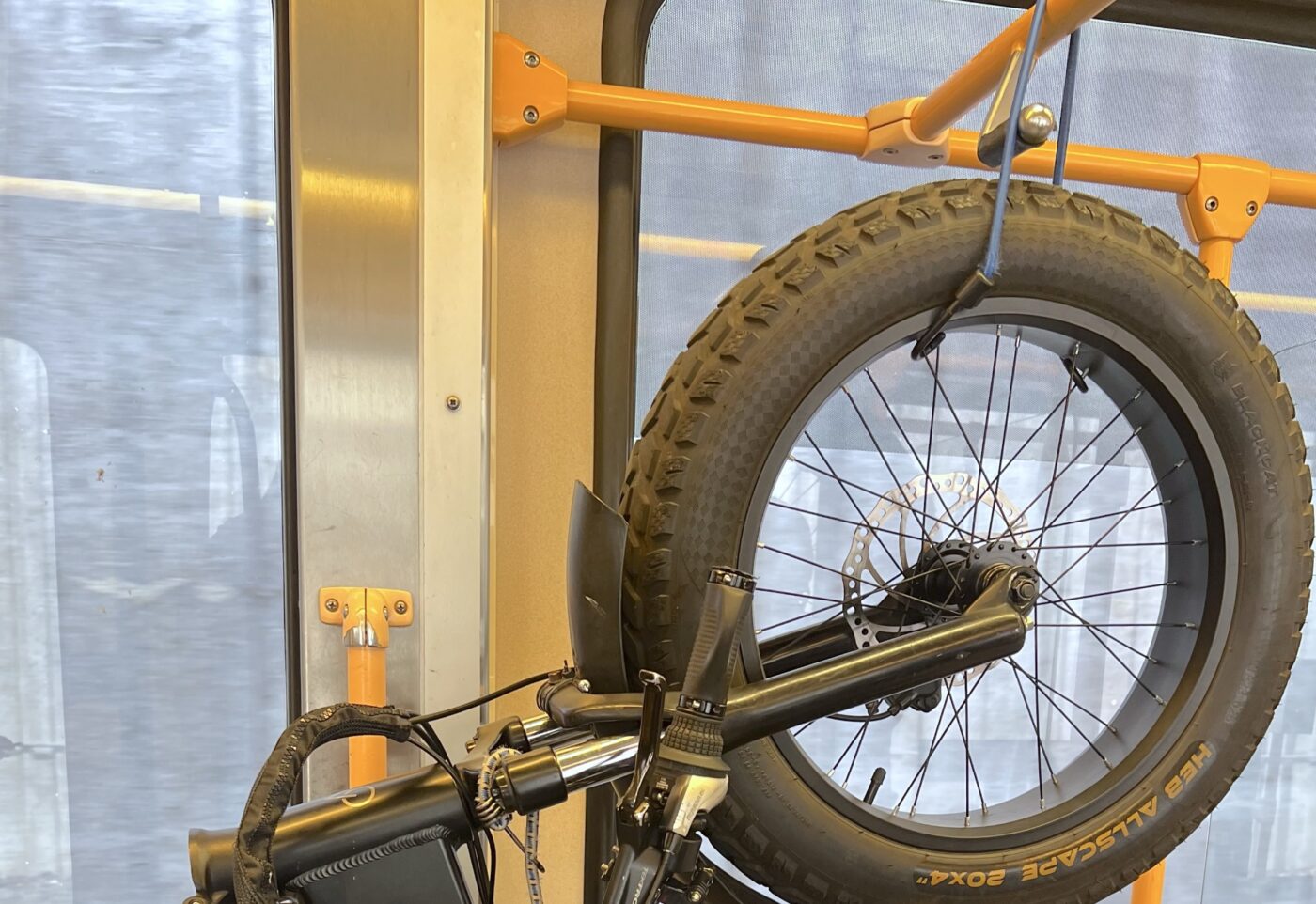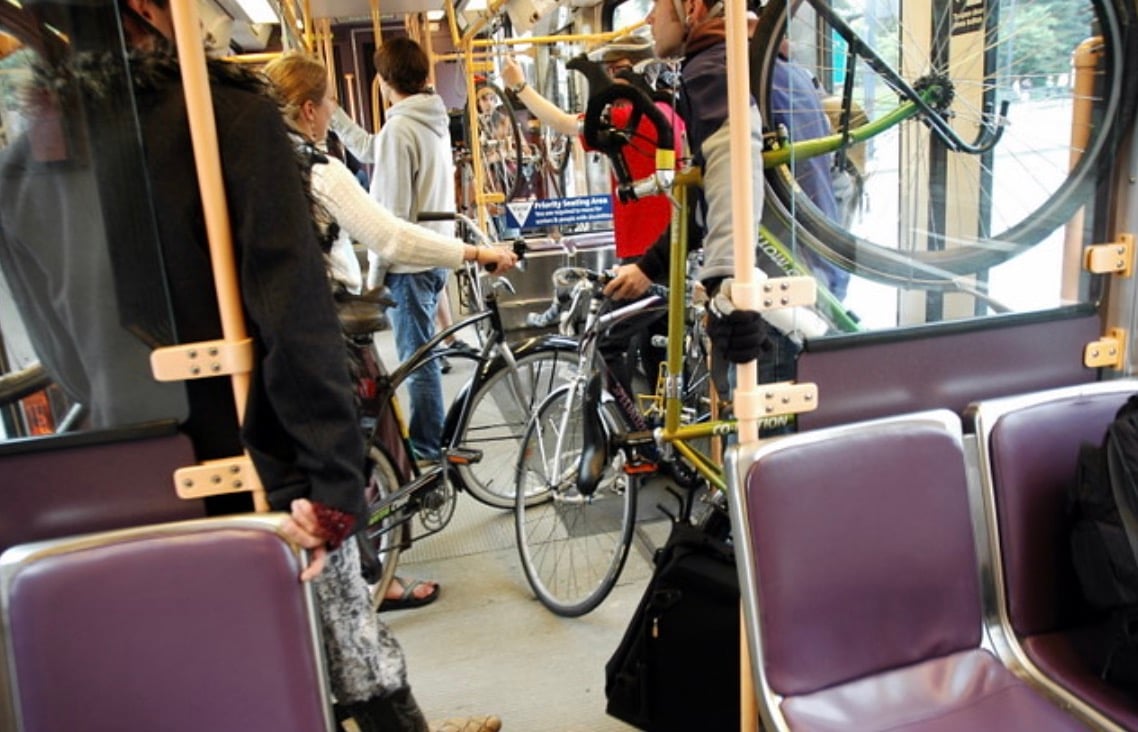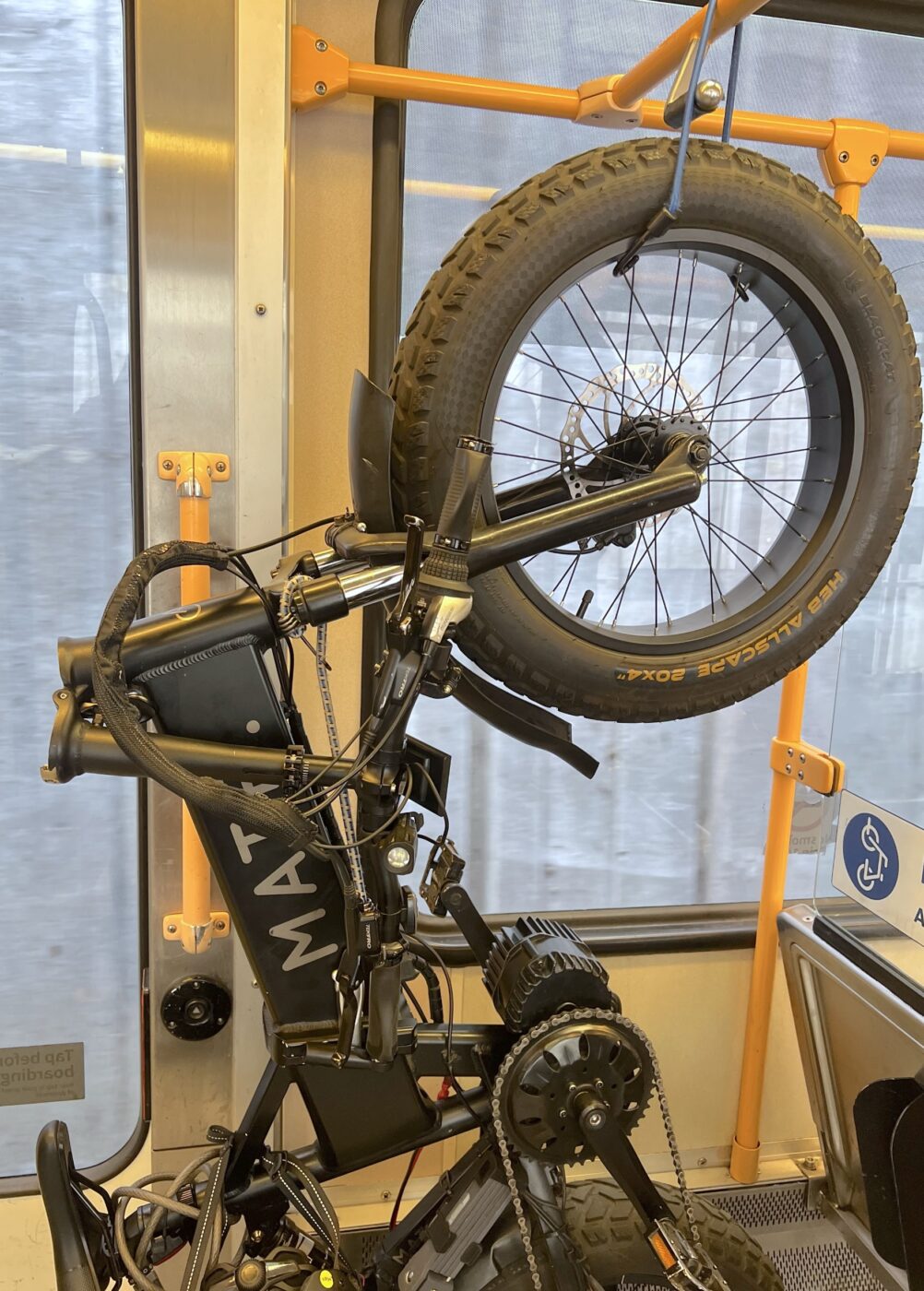
Electric bikes have the potential to radically transform American transportation culture in a very positive way. Despite this, and in contrast to how our society and systems treat electric cars, it often feels like e-bikes can’t catch a break.
A few examples: We have vast federal and state purchase incentives programs for e-cars, but none for e-bikes. We limit the speed of e-bikes, while e-cars — even though their potential for harm is much greater — are gleefully sold with “insane mode” acceleration and absurdly high speeds.
And in the past few weeks I’ve been contacted by two readers with stories about how the system is working against them when it comes to choosing to ride an e-bike. One of them was told they cannot park their e-bike at work; the other watched as a TriMet transit officer booted two e-bike riders off a MAX train because the bikes weren’t on designated bike hooks.
I looked into both situations and here’s what I found out.
Last week a reader messaged BikePortland on Instagram:
“This morning on the MAX going out to Hillsboro some TriMet guy got on to check tickets. On his way out he told two guys with e-bikes they weren’t allowed to have them on the train because they couldn’t hang them!? I was shook.
Just felt ridiculous TriMet would deny someone bring their bike on board because their tires were “too big” it’s not even prohibited on their website, which that guy said it was. I’ve never seen anyone kicked off the MAX for having an e-bike! It wasn’t that packed at all.”
This was very disappointing to hear because the combination of e-bikes and light rail is a powerful tool that can expand non-driving possibilities for many folks in our region. I reached out to TriMet to learn more.
According to TriMet Public Information Officer Tyler Graf, e-bikes with sealed battery compartments are allowed on MAX trains. What if someone can’t lift their e-bike onto a hook? Graf said hanging bikes on hooks is the preferred option. “However, we know e-bikes can be heavy, and it may be difficult or dangerous to lift them up and down,” he said. “Riders are allowed to stand with their bikes, but they should not block doors or aisles,” Graf clarified.
In short, your bike should never create an accessibility problem for other riders. TriMet’s rules for riding state, “If you have a bag or bike, make sure it’s not blocking the aisle or doorway.” And Graf added that people should be mindful of these rules because TriMet’s recent enforcement increase includes bicycles on trains as, “an area of extra focus.”
As for the specific case of telling two e-bike riders to disembark, Graf said these “Customer Safety Supervisors” are taking an education-first approach whenever possible. He also shared that the size and type of someone’s bike also comes into play in how enforcement decisions are made: “Bikes with oversized wheels, trailers or internal combustion engines are not allowed at all. Not only is it impossible to hang these types of vehicles from the bike hooks, they pose a danger if the train has to stop suddenly and they’re thrown forward.”
(On a related note, TriMet’s administrative rules state, “Only conventional single seat, two-wheeled bicycles, folding bicycles, and recumbent and electric bicycles the size of a standard bicycle” are allowed on their vehicles. “Bicycles with oversized wheels, tandems, three or more wheels, trailers, or internal combustion engine-powered bicycles are not allowed.”)
To summarize: Try to store your bike on a hook. If you can’t do that, make sure you and your bike have a small footprint and allow easy access to priority seating areas. I met a man on MAX a few days ago with a 20-inch wheeled, folding, fat tire e-bike (above). He carried his own bungee cord to strap the wheel to the hook and folded the handlebars in to keep them from snagging other riders near the door. He knows that if people are impeded or have to step over a bike for any reason, a rider could be asked to leave the train. See TriMet’s Bikes on MAX website and their administrative rules for “Transport of Bicycles on District Transit System (August 2022)” for more information.
The second example comes from a reader who works at the downtown Marriot hotel. They were told e-bikes were not allowed on the property. “Now I can’t use my electric bike to commute to work and would appreciate any suggestions/solutions to this dilemma,” they wrote to BikePortland.
I first reached out to the Portland Fire Bureau. Senior Fire Inspector/Lieutenant Wendy Stanley told me, “The Fire Marshal’s Office has no stance or prohibition on storing and charging e-bikes inside of buildings. Such a prohibition, if created, would be at the discretion of the property owner/management company.”
Lt. Stanley was right. A few days later I heard from the Marriott employee. They since heard from management that the “no e-bikes” order came from Marriott’s own fire inspector who has banned electric bikes and scooters from the hotel property.
“That’s a lot of properties limiting electric transportation,” our reader shared. “I know Tesla has chargers onsite at many properties so apparently the ban doesn’t apply to electric vehicles.”
Hopefully as e-bikes continue their march toward normalization in American society, the rules that apply to them will change. In a truly just society e-bike rules wouldn’t be on par with e-cars, they would be much more favorable and would do everything possible to encourage their use.





